Corporate Secretarial Case Study: Business Law - Sportive Ltd Analysis
VerifiedAdded on 2023/06/07
|57
|17520
|80
Case Study
AI Summary
This case study analyzes the legal obligations and potential breaches committed by Sportive Ltd and its directors under UK company and employment law. It identifies key legal issues such as the validity of changes to the company's articles, potential breaches of directors' duties, insolvent trading, and the legality of employee dismissals and dividend issuance. Relevant legal provisions from the Companies Act 2006 and the Employment Rights Act 1996 are applied to the facts of the case to determine whether legal violations have occurred. The analysis covers areas including share allocation, amendment of articles, directors' duties, insolvent trading, employee dismissal, dividend legality, and the obligation to provide references. The document provides a comprehensive legal assessment of Sportive Ltd's actions based on UK law and relevant case precedents.
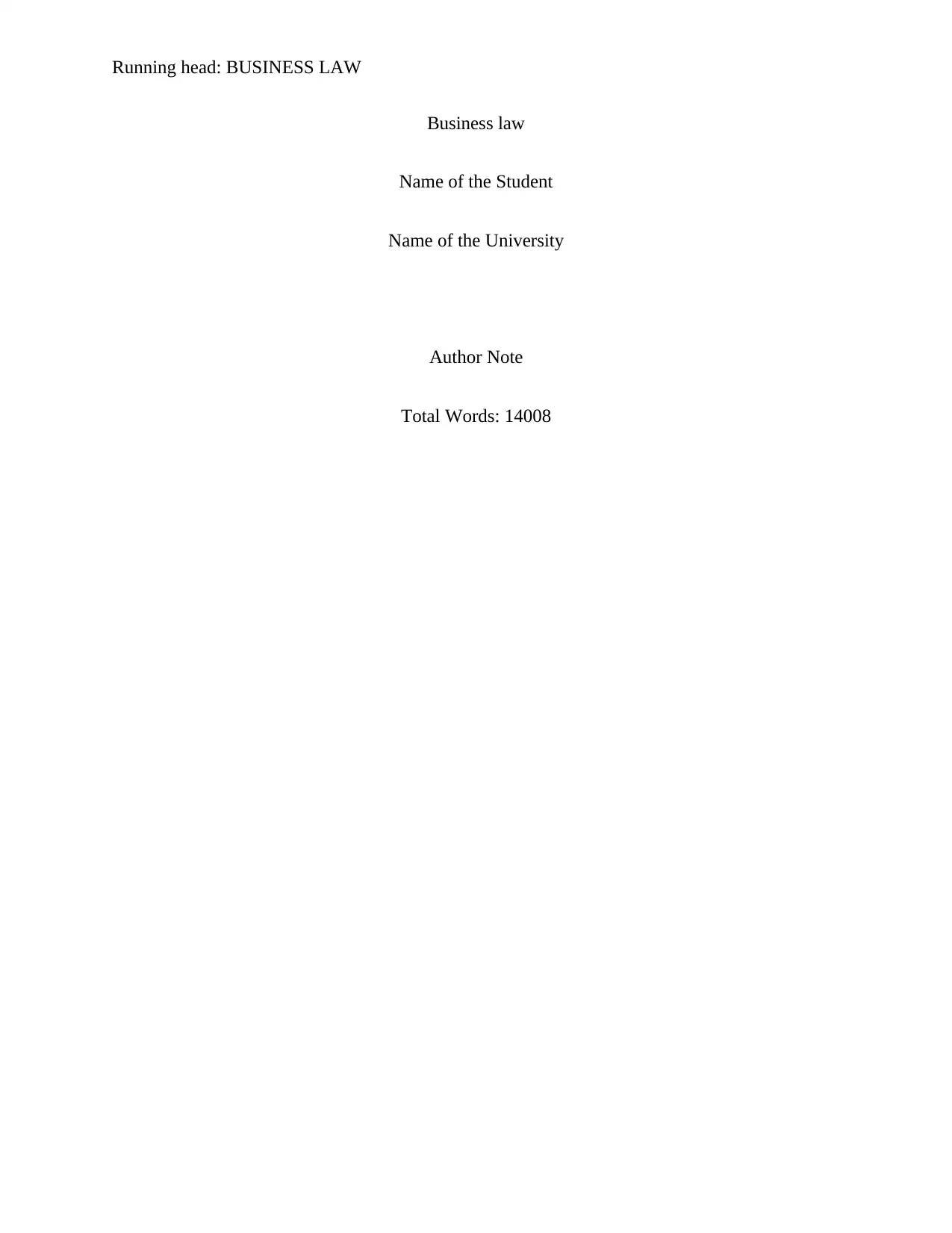
Running head: BUSINESS LAW
Business law
Name of the Student
Name of the University
Author Note
Total Words: 14008
Business law
Name of the Student
Name of the University
Author Note
Total Words: 14008
Paraphrase This Document
Need a fresh take? Get an instant paraphrase of this document with our AI Paraphraser
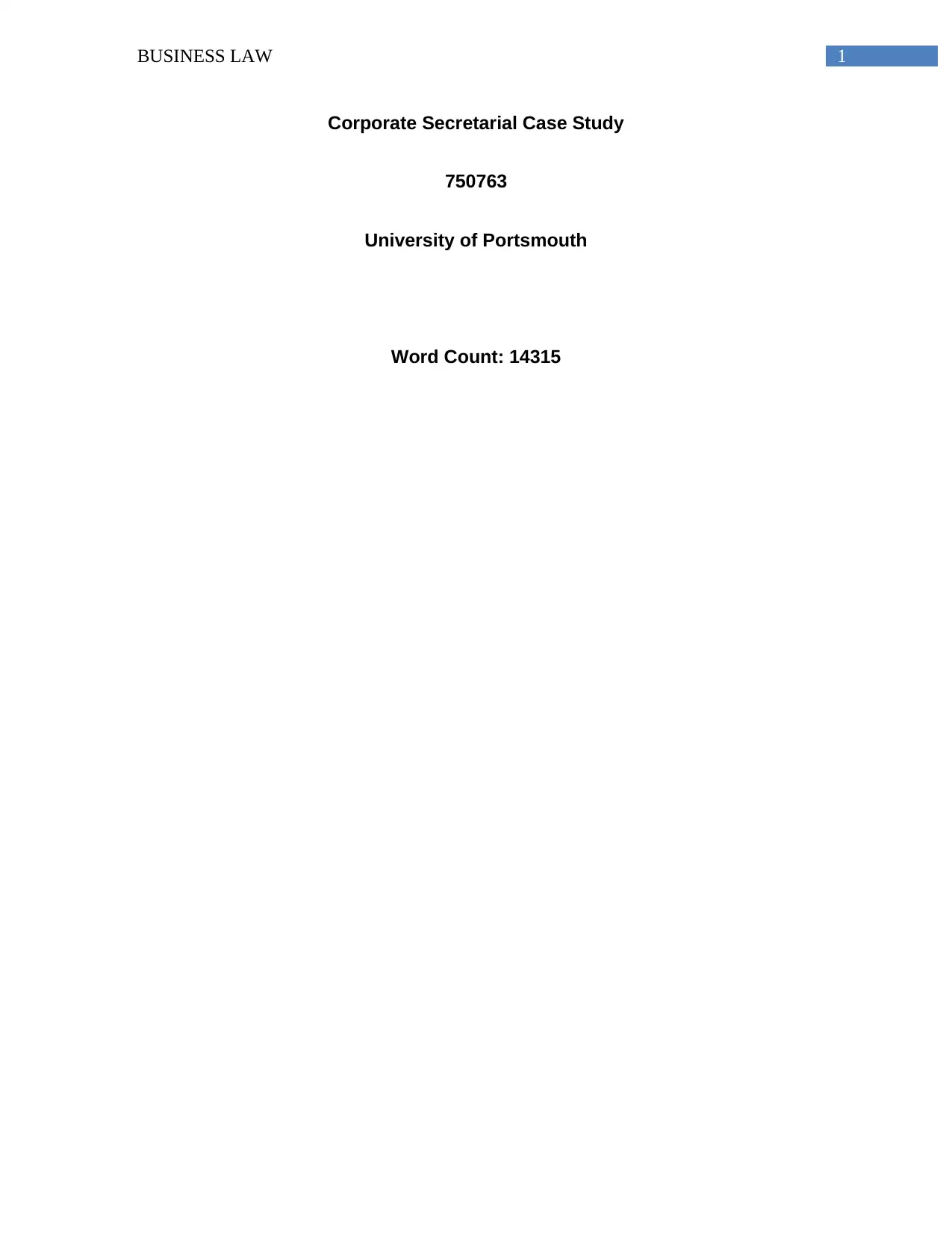
1BUSINESS LAW
Corporate Secretarial Case Study
750763
University of Portsmouth
Word Count: 14315
Corporate Secretarial Case Study
750763
University of Portsmouth
Word Count: 14315
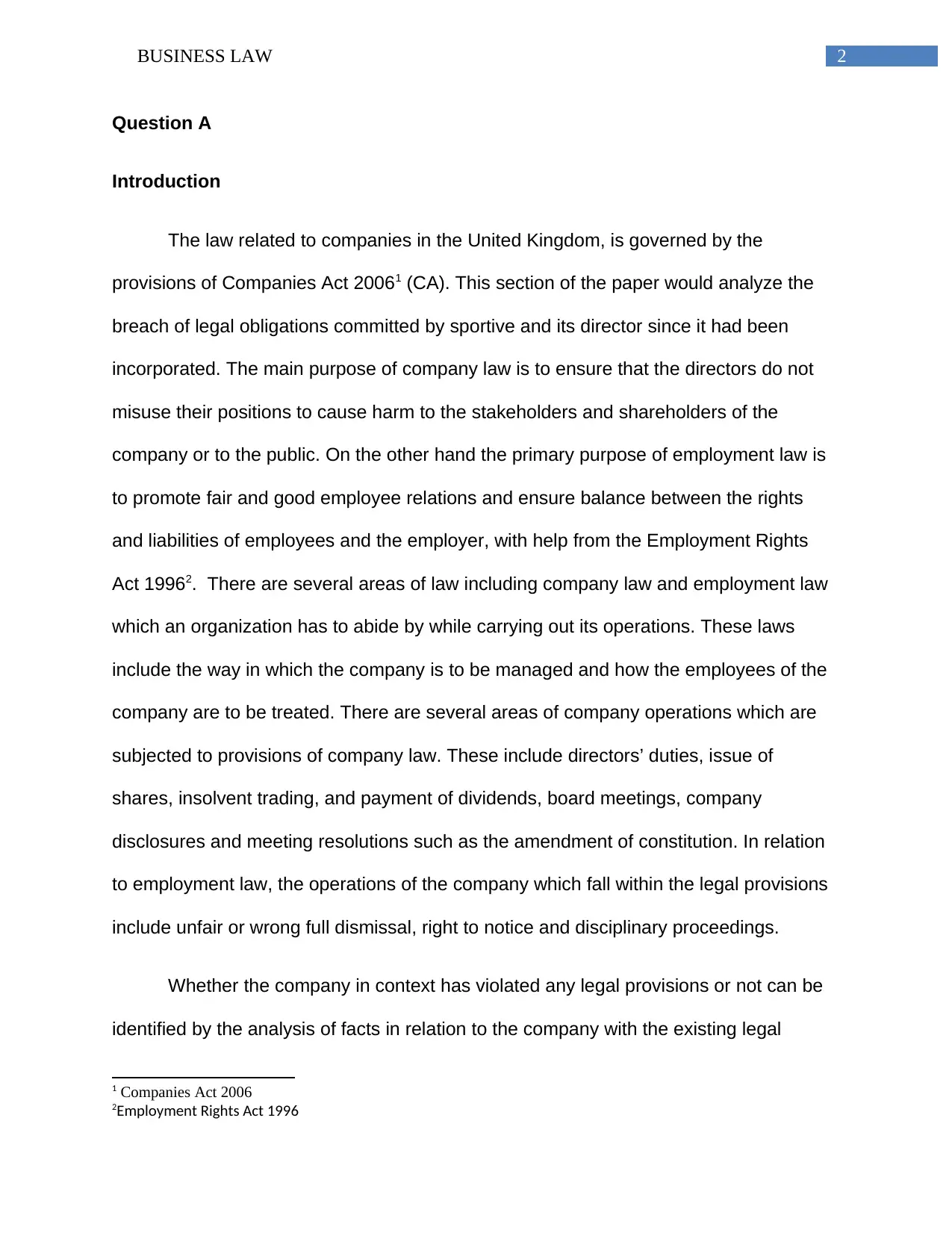
2BUSINESS LAW
Question A
Introduction
The law related to companies in the United Kingdom, is governed by the
provisions of Companies Act 20061 (CA). This section of the paper would analyze the
breach of legal obligations committed by sportive and its director since it had been
incorporated. The main purpose of company law is to ensure that the directors do not
misuse their positions to cause harm to the stakeholders and shareholders of the
company or to the public. On the other hand the primary purpose of employment law is
to promote fair and good employee relations and ensure balance between the rights
and liabilities of employees and the employer, with help from the Employment Rights
Act 19962. There are several areas of law including company law and employment law
which an organization has to abide by while carrying out its operations. These laws
include the way in which the company is to be managed and how the employees of the
company are to be treated. There are several areas of company operations which are
subjected to provisions of company law. These include directors’ duties, issue of
shares, insolvent trading, and payment of dividends, board meetings, company
disclosures and meeting resolutions such as the amendment of constitution. In relation
to employment law, the operations of the company which fall within the legal provisions
include unfair or wrong full dismissal, right to notice and disciplinary proceedings.
Whether the company in context has violated any legal provisions or not can be
identified by the analysis of facts in relation to the company with the existing legal
1 Companies Act 2006
2Employment Rights Act 1996
Question A
Introduction
The law related to companies in the United Kingdom, is governed by the
provisions of Companies Act 20061 (CA). This section of the paper would analyze the
breach of legal obligations committed by sportive and its director since it had been
incorporated. The main purpose of company law is to ensure that the directors do not
misuse their positions to cause harm to the stakeholders and shareholders of the
company or to the public. On the other hand the primary purpose of employment law is
to promote fair and good employee relations and ensure balance between the rights
and liabilities of employees and the employer, with help from the Employment Rights
Act 19962. There are several areas of law including company law and employment law
which an organization has to abide by while carrying out its operations. These laws
include the way in which the company is to be managed and how the employees of the
company are to be treated. There are several areas of company operations which are
subjected to provisions of company law. These include directors’ duties, issue of
shares, insolvent trading, and payment of dividends, board meetings, company
disclosures and meeting resolutions such as the amendment of constitution. In relation
to employment law, the operations of the company which fall within the legal provisions
include unfair or wrong full dismissal, right to notice and disciplinary proceedings.
Whether the company in context has violated any legal provisions or not can be
identified by the analysis of facts in relation to the company with the existing legal
1 Companies Act 2006
2Employment Rights Act 1996
⊘ This is a preview!⊘
Do you want full access?
Subscribe today to unlock all pages.

Trusted by 1+ million students worldwide
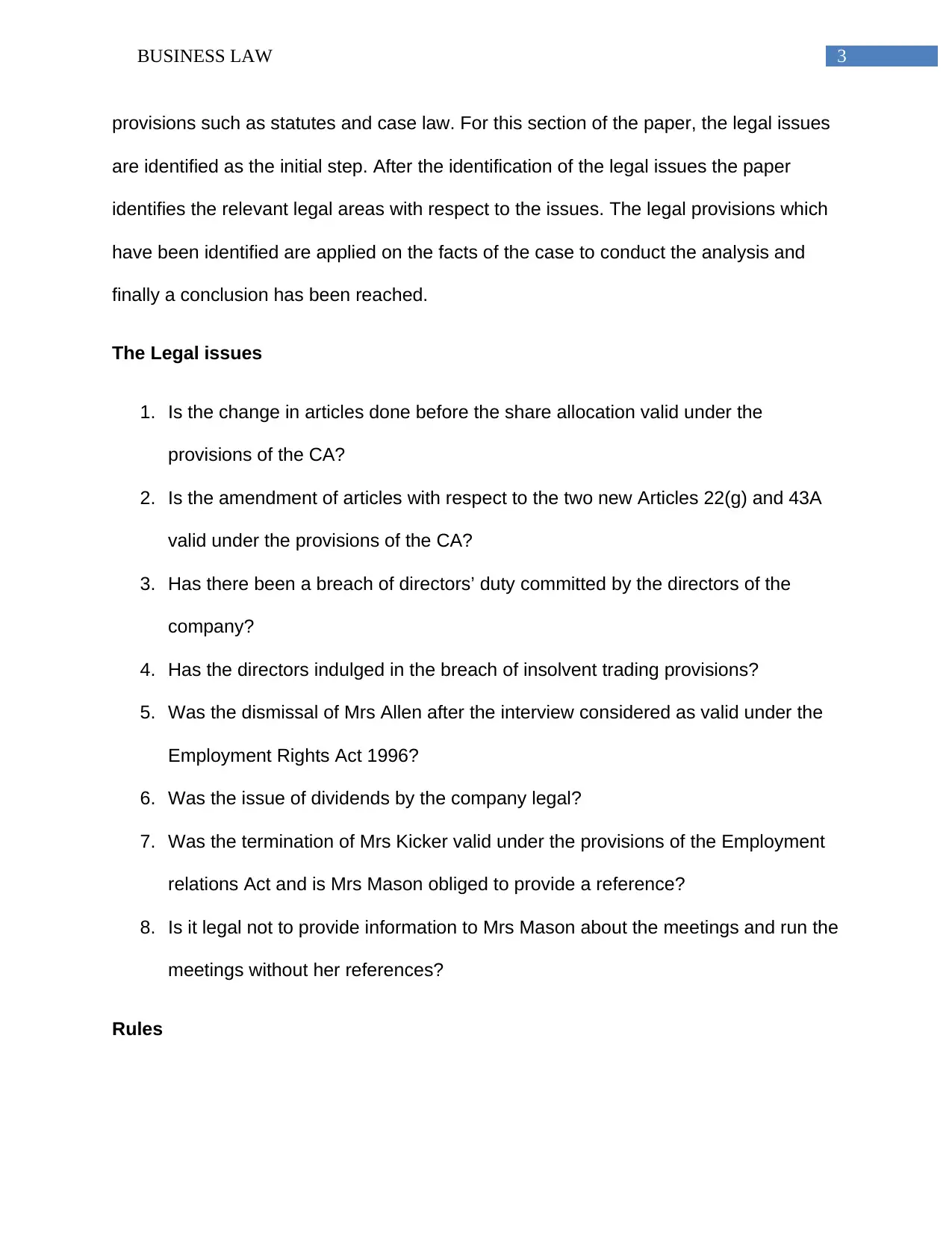
3BUSINESS LAW
provisions such as statutes and case law. For this section of the paper, the legal issues
are identified as the initial step. After the identification of the legal issues the paper
identifies the relevant legal areas with respect to the issues. The legal provisions which
have been identified are applied on the facts of the case to conduct the analysis and
finally a conclusion has been reached.
The Legal issues
1. Is the change in articles done before the share allocation valid under the
provisions of the CA?
2. Is the amendment of articles with respect to the two new Articles 22(g) and 43A
valid under the provisions of the CA?
3. Has there been a breach of directors’ duty committed by the directors of the
company?
4. Has the directors indulged in the breach of insolvent trading provisions?
5. Was the dismissal of Mrs Allen after the interview considered as valid under the
Employment Rights Act 1996?
6. Was the issue of dividends by the company legal?
7. Was the termination of Mrs Kicker valid under the provisions of the Employment
relations Act and is Mrs Mason obliged to provide a reference?
8. Is it legal not to provide information to Mrs Mason about the meetings and run the
meetings without her references?
Rules
provisions such as statutes and case law. For this section of the paper, the legal issues
are identified as the initial step. After the identification of the legal issues the paper
identifies the relevant legal areas with respect to the issues. The legal provisions which
have been identified are applied on the facts of the case to conduct the analysis and
finally a conclusion has been reached.
The Legal issues
1. Is the change in articles done before the share allocation valid under the
provisions of the CA?
2. Is the amendment of articles with respect to the two new Articles 22(g) and 43A
valid under the provisions of the CA?
3. Has there been a breach of directors’ duty committed by the directors of the
company?
4. Has the directors indulged in the breach of insolvent trading provisions?
5. Was the dismissal of Mrs Allen after the interview considered as valid under the
Employment Rights Act 1996?
6. Was the issue of dividends by the company legal?
7. Was the termination of Mrs Kicker valid under the provisions of the Employment
relations Act and is Mrs Mason obliged to provide a reference?
8. Is it legal not to provide information to Mrs Mason about the meetings and run the
meetings without her references?
Rules
Paraphrase This Document
Need a fresh take? Get an instant paraphrase of this document with our AI Paraphraser
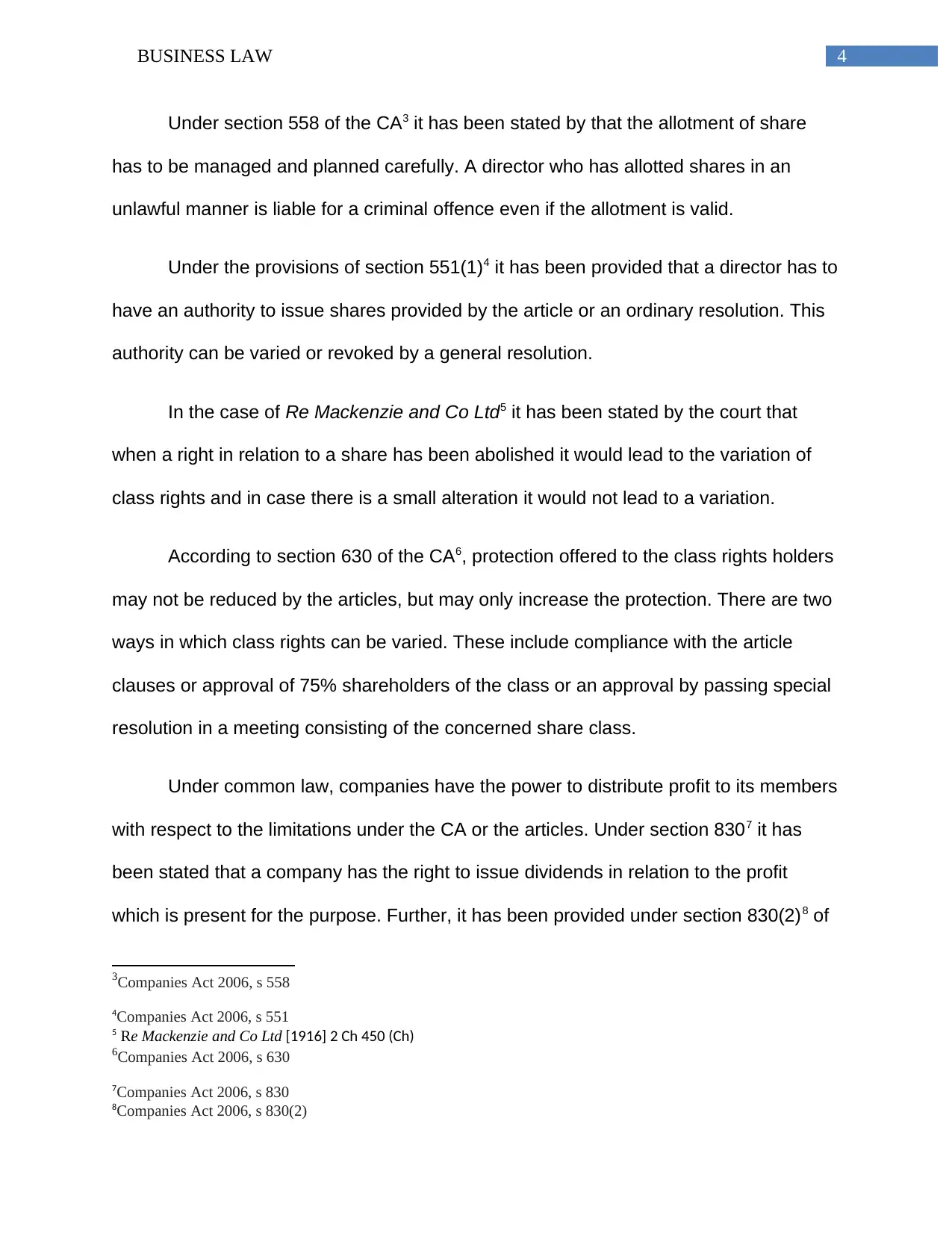
4BUSINESS LAW
Under section 558 of the CA3 it has been stated by that the allotment of share
has to be managed and planned carefully. A director who has allotted shares in an
unlawful manner is liable for a criminal offence even if the allotment is valid.
Under the provisions of section 551(1)4 it has been provided that a director has to
have an authority to issue shares provided by the article or an ordinary resolution. This
authority can be varied or revoked by a general resolution.
In the case of Re Mackenzie and Co Ltd5 it has been stated by the court that
when a right in relation to a share has been abolished it would lead to the variation of
class rights and in case there is a small alteration it would not lead to a variation.
According to section 630 of the CA6, protection offered to the class rights holders
may not be reduced by the articles, but may only increase the protection. There are two
ways in which class rights can be varied. These include compliance with the article
clauses or approval of 75% shareholders of the class or an approval by passing special
resolution in a meeting consisting of the concerned share class.
Under common law, companies have the power to distribute profit to its members
with respect to the limitations under the CA or the articles. Under section 8307 it has
been stated that a company has the right to issue dividends in relation to the profit
which is present for the purpose. Further, it has been provided under section 830(2)8 of
3Companies Act 2006, s 558
4Companies Act 2006, s 551
5 Re Mackenzie and Co Ltd [1916] 2 Ch 450 (Ch)
6Companies Act 2006, s 630
7Companies Act 2006, s 830
8Companies Act 2006, s 830(2)
Under section 558 of the CA3 it has been stated by that the allotment of share
has to be managed and planned carefully. A director who has allotted shares in an
unlawful manner is liable for a criminal offence even if the allotment is valid.
Under the provisions of section 551(1)4 it has been provided that a director has to
have an authority to issue shares provided by the article or an ordinary resolution. This
authority can be varied or revoked by a general resolution.
In the case of Re Mackenzie and Co Ltd5 it has been stated by the court that
when a right in relation to a share has been abolished it would lead to the variation of
class rights and in case there is a small alteration it would not lead to a variation.
According to section 630 of the CA6, protection offered to the class rights holders
may not be reduced by the articles, but may only increase the protection. There are two
ways in which class rights can be varied. These include compliance with the article
clauses or approval of 75% shareholders of the class or an approval by passing special
resolution in a meeting consisting of the concerned share class.
Under common law, companies have the power to distribute profit to its members
with respect to the limitations under the CA or the articles. Under section 8307 it has
been stated that a company has the right to issue dividends in relation to the profit
which is present for the purpose. Further, it has been provided under section 830(2)8 of
3Companies Act 2006, s 558
4Companies Act 2006, s 551
5 Re Mackenzie and Co Ltd [1916] 2 Ch 450 (Ch)
6Companies Act 2006, s 630
7Companies Act 2006, s 830
8Companies Act 2006, s 830(2)
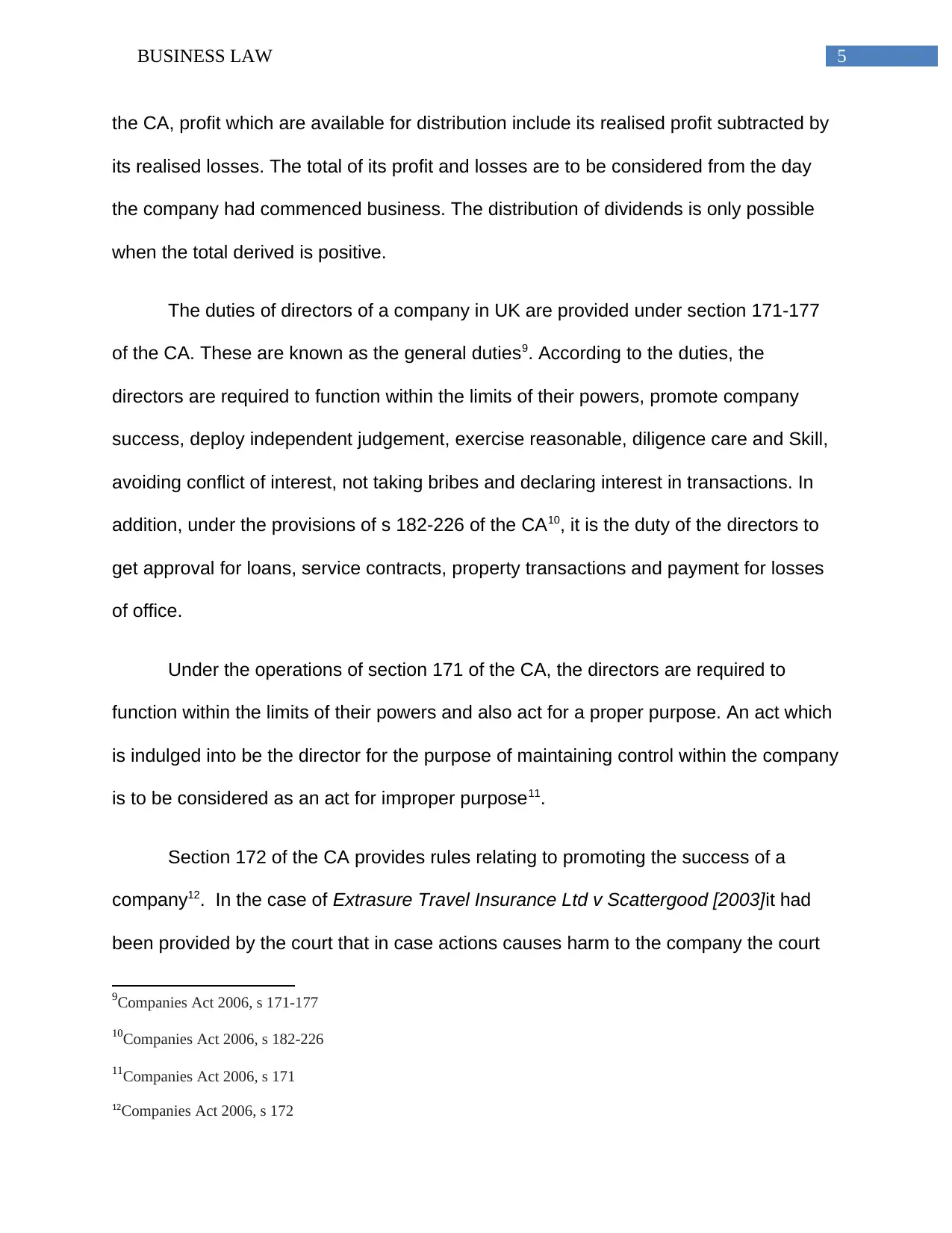
5BUSINESS LAW
the CA, profit which are available for distribution include its realised profit subtracted by
its realised losses. The total of its profit and losses are to be considered from the day
the company had commenced business. The distribution of dividends is only possible
when the total derived is positive.
The duties of directors of a company in UK are provided under section 171-177
of the CA. These are known as the general duties9. According to the duties, the
directors are required to function within the limits of their powers, promote company
success, deploy independent judgement, exercise reasonable, diligence care and Skill,
avoiding conflict of interest, not taking bribes and declaring interest in transactions. In
addition, under the provisions of s 182-226 of the CA10, it is the duty of the directors to
get approval for loans, service contracts, property transactions and payment for losses
of office.
Under the operations of section 171 of the CA, the directors are required to
function within the limits of their powers and also act for a proper purpose. An act which
is indulged into be the director for the purpose of maintaining control within the company
is to be considered as an act for improper purpose11.
Section 172 of the CA provides rules relating to promoting the success of a
company12. In the case of Extrasure Travel Insurance Ltd v Scattergood [2003]it had
been provided by the court that in case actions causes harm to the company the court
9Companies Act 2006, s 171-177
10Companies Act 2006, s 182-226
11Companies Act 2006, s 171
12Companies Act 2006, s 172
the CA, profit which are available for distribution include its realised profit subtracted by
its realised losses. The total of its profit and losses are to be considered from the day
the company had commenced business. The distribution of dividends is only possible
when the total derived is positive.
The duties of directors of a company in UK are provided under section 171-177
of the CA. These are known as the general duties9. According to the duties, the
directors are required to function within the limits of their powers, promote company
success, deploy independent judgement, exercise reasonable, diligence care and Skill,
avoiding conflict of interest, not taking bribes and declaring interest in transactions. In
addition, under the provisions of s 182-226 of the CA10, it is the duty of the directors to
get approval for loans, service contracts, property transactions and payment for losses
of office.
Under the operations of section 171 of the CA, the directors are required to
function within the limits of their powers and also act for a proper purpose. An act which
is indulged into be the director for the purpose of maintaining control within the company
is to be considered as an act for improper purpose11.
Section 172 of the CA provides rules relating to promoting the success of a
company12. In the case of Extrasure Travel Insurance Ltd v Scattergood [2003]it had
been provided by the court that in case actions causes harm to the company the court
9Companies Act 2006, s 171-177
10Companies Act 2006, s 182-226
11Companies Act 2006, s 171
12Companies Act 2006, s 172
⊘ This is a preview!⊘
Do you want full access?
Subscribe today to unlock all pages.

Trusted by 1+ million students worldwide
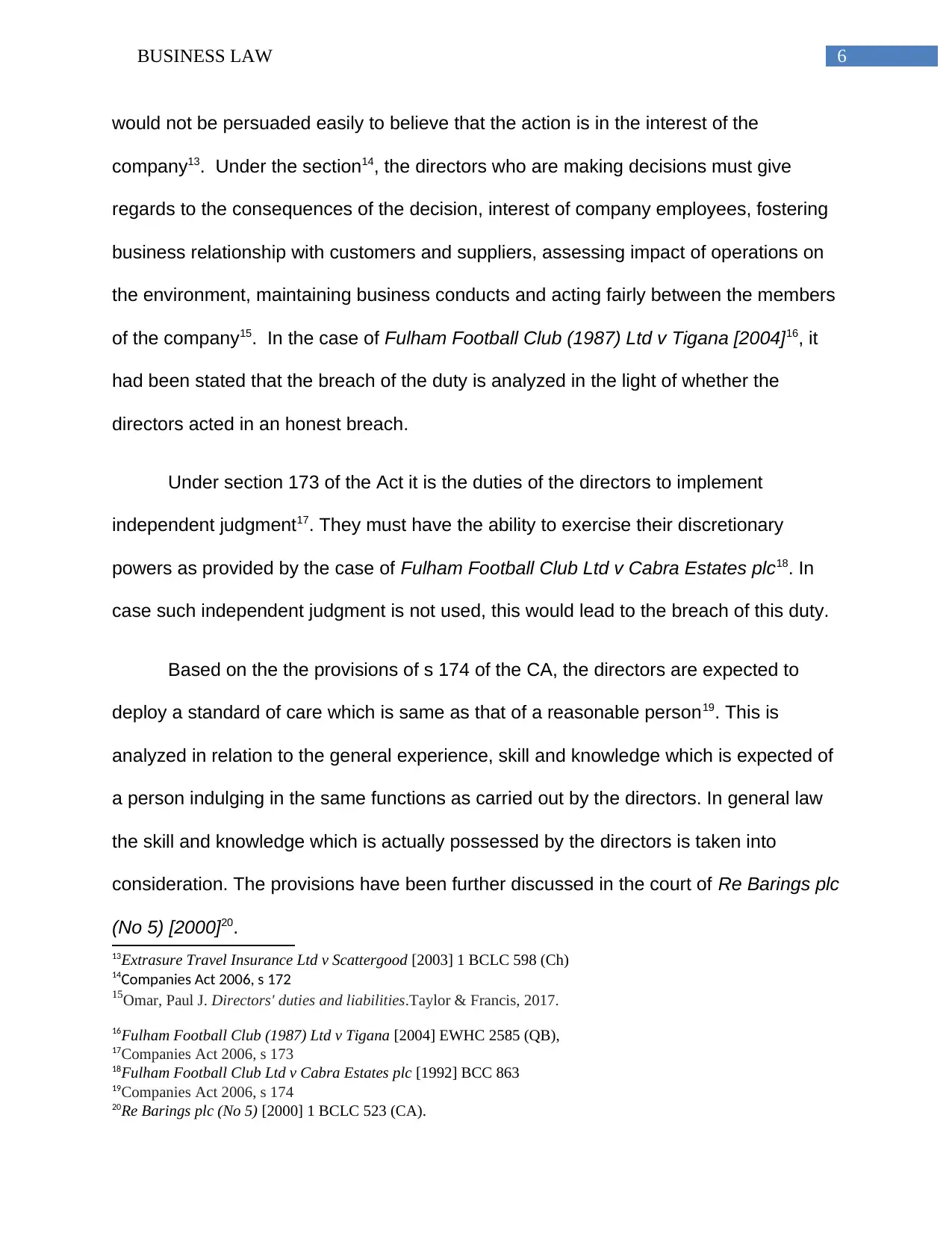
6BUSINESS LAW
would not be persuaded easily to believe that the action is in the interest of the
company13. Under the section14, the directors who are making decisions must give
regards to the consequences of the decision, interest of company employees, fostering
business relationship with customers and suppliers, assessing impact of operations on
the environment, maintaining business conducts and acting fairly between the members
of the company15. In the case of Fulham Football Club (1987) Ltd v Tigana [2004]16, it
had been stated that the breach of the duty is analyzed in the light of whether the
directors acted in an honest breach.
Under section 173 of the Act it is the duties of the directors to implement
independent judgment17. They must have the ability to exercise their discretionary
powers as provided by the case of Fulham Football Club Ltd v Cabra Estates plc18. In
case such independent judgment is not used, this would lead to the breach of this duty.
Based on the the provisions of s 174 of the CA, the directors are expected to
deploy a standard of care which is same as that of a reasonable person19. This is
analyzed in relation to the general experience, skill and knowledge which is expected of
a person indulging in the same functions as carried out by the directors. In general law
the skill and knowledge which is actually possessed by the directors is taken into
consideration. The provisions have been further discussed in the court of Re Barings plc
(No 5) [2000]20.
13Extrasure Travel Insurance Ltd v Scattergood [2003] 1 BCLC 598 (Ch)
14Companies Act 2006, s 172
15Omar, Paul J. Directors' duties and liabilities.Taylor & Francis, 2017.
16Fulham Football Club (1987) Ltd v Tigana [2004] EWHC 2585 (QB),
17Companies Act 2006, s 173
18Fulham Football Club Ltd v Cabra Estates plc [1992] BCC 863
19Companies Act 2006, s 174
20Re Barings plc (No 5) [2000] 1 BCLC 523 (CA).
would not be persuaded easily to believe that the action is in the interest of the
company13. Under the section14, the directors who are making decisions must give
regards to the consequences of the decision, interest of company employees, fostering
business relationship with customers and suppliers, assessing impact of operations on
the environment, maintaining business conducts and acting fairly between the members
of the company15. In the case of Fulham Football Club (1987) Ltd v Tigana [2004]16, it
had been stated that the breach of the duty is analyzed in the light of whether the
directors acted in an honest breach.
Under section 173 of the Act it is the duties of the directors to implement
independent judgment17. They must have the ability to exercise their discretionary
powers as provided by the case of Fulham Football Club Ltd v Cabra Estates plc18. In
case such independent judgment is not used, this would lead to the breach of this duty.
Based on the the provisions of s 174 of the CA, the directors are expected to
deploy a standard of care which is same as that of a reasonable person19. This is
analyzed in relation to the general experience, skill and knowledge which is expected of
a person indulging in the same functions as carried out by the directors. In general law
the skill and knowledge which is actually possessed by the directors is taken into
consideration. The provisions have been further discussed in the court of Re Barings plc
(No 5) [2000]20.
13Extrasure Travel Insurance Ltd v Scattergood [2003] 1 BCLC 598 (Ch)
14Companies Act 2006, s 172
15Omar, Paul J. Directors' duties and liabilities.Taylor & Francis, 2017.
16Fulham Football Club (1987) Ltd v Tigana [2004] EWHC 2585 (QB),
17Companies Act 2006, s 173
18Fulham Football Club Ltd v Cabra Estates plc [1992] BCC 863
19Companies Act 2006, s 174
20Re Barings plc (No 5) [2000] 1 BCLC 523 (CA).
Paraphrase This Document
Need a fresh take? Get an instant paraphrase of this document with our AI Paraphraser
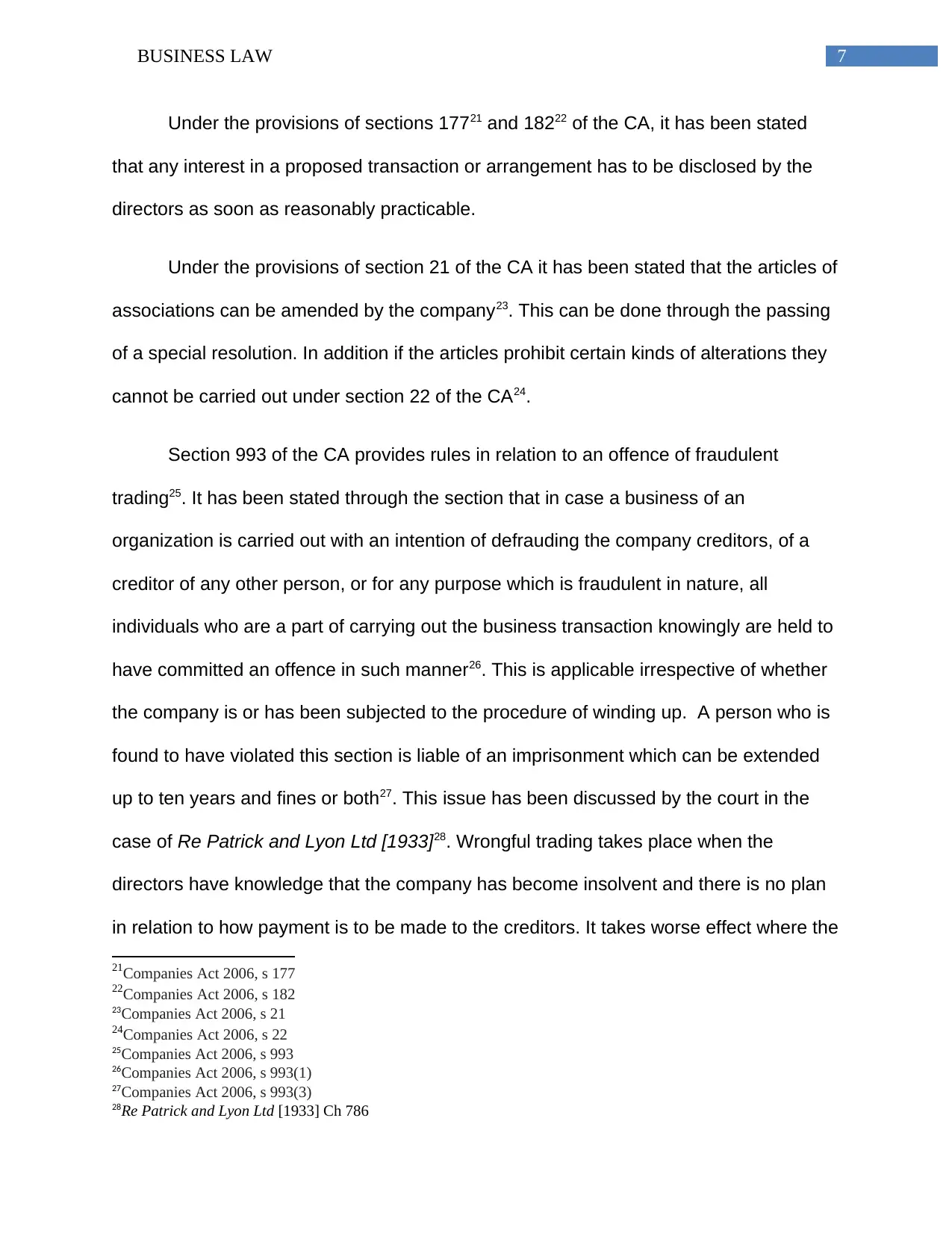
7BUSINESS LAW
Under the provisions of sections 17721 and 18222 of the CA, it has been stated
that any interest in a proposed transaction or arrangement has to be disclosed by the
directors as soon as reasonably practicable.
Under the provisions of section 21 of the CA it has been stated that the articles of
associations can be amended by the company23. This can be done through the passing
of a special resolution. In addition if the articles prohibit certain kinds of alterations they
cannot be carried out under section 22 of the CA24.
Section 993 of the CA provides rules in relation to an offence of fraudulent
trading25. It has been stated through the section that in case a business of an
organization is carried out with an intention of defrauding the company creditors, of a
creditor of any other person, or for any purpose which is fraudulent in nature, all
individuals who are a part of carrying out the business transaction knowingly are held to
have committed an offence in such manner26. This is applicable irrespective of whether
the company is or has been subjected to the procedure of winding up. A person who is
found to have violated this section is liable of an imprisonment which can be extended
up to ten years and fines or both27. This issue has been discussed by the court in the
case of Re Patrick and Lyon Ltd [1933]28. Wrongful trading takes place when the
directors have knowledge that the company has become insolvent and there is no plan
in relation to how payment is to be made to the creditors. It takes worse effect where the
21Companies Act 2006, s 177
22Companies Act 2006, s 182
23Companies Act 2006, s 21
24Companies Act 2006, s 22
25Companies Act 2006, s 993
26Companies Act 2006, s 993(1)
27Companies Act 2006, s 993(3)
28Re Patrick and Lyon Ltd [1933] Ch 786
Under the provisions of sections 17721 and 18222 of the CA, it has been stated
that any interest in a proposed transaction or arrangement has to be disclosed by the
directors as soon as reasonably practicable.
Under the provisions of section 21 of the CA it has been stated that the articles of
associations can be amended by the company23. This can be done through the passing
of a special resolution. In addition if the articles prohibit certain kinds of alterations they
cannot be carried out under section 22 of the CA24.
Section 993 of the CA provides rules in relation to an offence of fraudulent
trading25. It has been stated through the section that in case a business of an
organization is carried out with an intention of defrauding the company creditors, of a
creditor of any other person, or for any purpose which is fraudulent in nature, all
individuals who are a part of carrying out the business transaction knowingly are held to
have committed an offence in such manner26. This is applicable irrespective of whether
the company is or has been subjected to the procedure of winding up. A person who is
found to have violated this section is liable of an imprisonment which can be extended
up to ten years and fines or both27. This issue has been discussed by the court in the
case of Re Patrick and Lyon Ltd [1933]28. Wrongful trading takes place when the
directors have knowledge that the company has become insolvent and there is no plan
in relation to how payment is to be made to the creditors. It takes worse effect where the
21Companies Act 2006, s 177
22Companies Act 2006, s 182
23Companies Act 2006, s 21
24Companies Act 2006, s 22
25Companies Act 2006, s 993
26Companies Act 2006, s 993(1)
27Companies Act 2006, s 993(3)
28Re Patrick and Lyon Ltd [1933] Ch 786
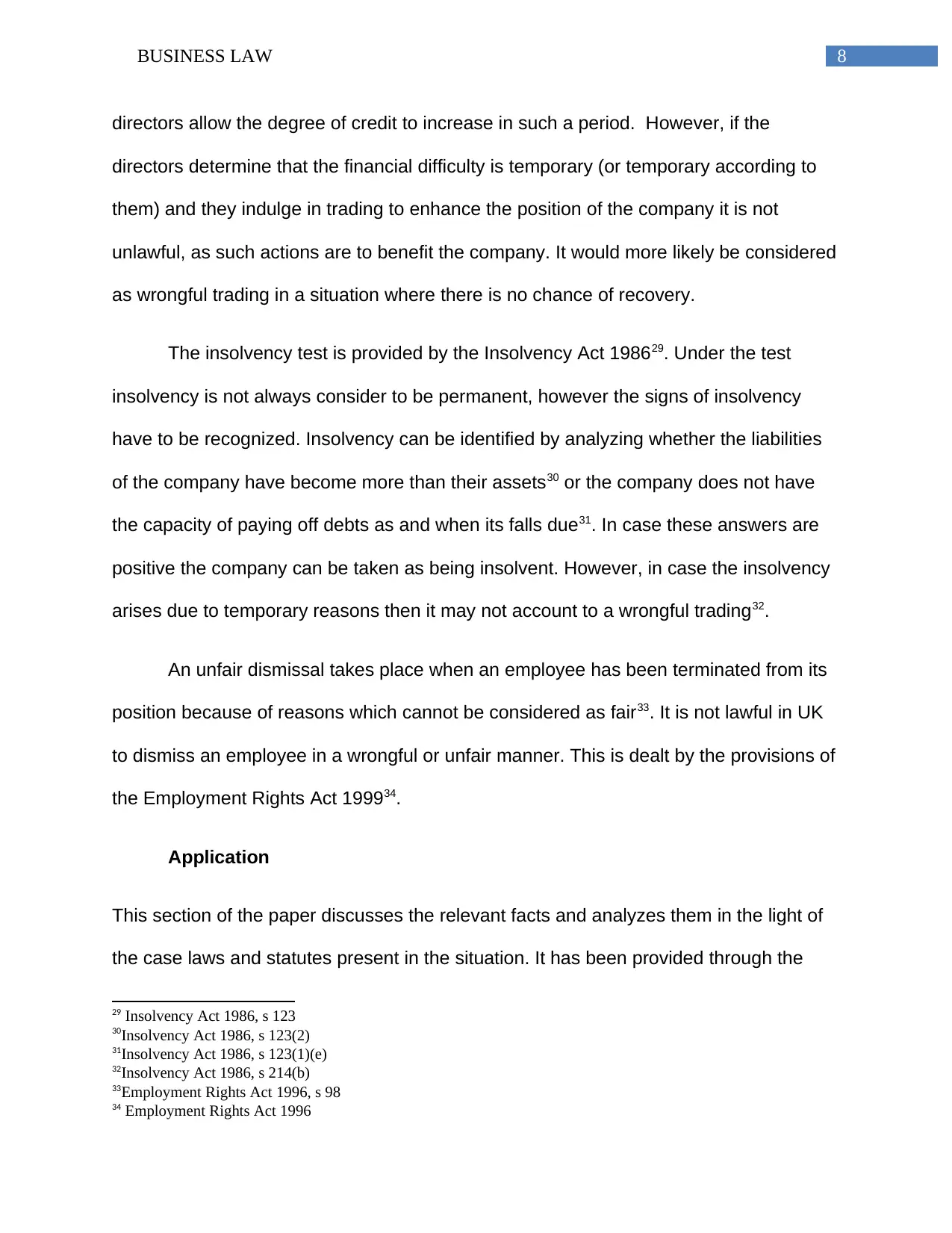
8BUSINESS LAW
directors allow the degree of credit to increase in such a period. However, if the
directors determine that the financial difficulty is temporary (or temporary according to
them) and they indulge in trading to enhance the position of the company it is not
unlawful, as such actions are to benefit the company. It would more likely be considered
as wrongful trading in a situation where there is no chance of recovery.
The insolvency test is provided by the Insolvency Act 198629. Under the test
insolvency is not always consider to be permanent, however the signs of insolvency
have to be recognized. Insolvency can be identified by analyzing whether the liabilities
of the company have become more than their assets30 or the company does not have
the capacity of paying off debts as and when its falls due31. In case these answers are
positive the company can be taken as being insolvent. However, in case the insolvency
arises due to temporary reasons then it may not account to a wrongful trading32.
An unfair dismissal takes place when an employee has been terminated from its
position because of reasons which cannot be considered as fair33. It is not lawful in UK
to dismiss an employee in a wrongful or unfair manner. This is dealt by the provisions of
the Employment Rights Act 199934.
Application
This section of the paper discusses the relevant facts and analyzes them in the light of
the case laws and statutes present in the situation. It has been provided through the
29 Insolvency Act 1986, s 123
30Insolvency Act 1986, s 123(2)
31Insolvency Act 1986, s 123(1)(e)
32Insolvency Act 1986, s 214(b)
33Employment Rights Act 1996, s 98
34 Employment Rights Act 1996
directors allow the degree of credit to increase in such a period. However, if the
directors determine that the financial difficulty is temporary (or temporary according to
them) and they indulge in trading to enhance the position of the company it is not
unlawful, as such actions are to benefit the company. It would more likely be considered
as wrongful trading in a situation where there is no chance of recovery.
The insolvency test is provided by the Insolvency Act 198629. Under the test
insolvency is not always consider to be permanent, however the signs of insolvency
have to be recognized. Insolvency can be identified by analyzing whether the liabilities
of the company have become more than their assets30 or the company does not have
the capacity of paying off debts as and when its falls due31. In case these answers are
positive the company can be taken as being insolvent. However, in case the insolvency
arises due to temporary reasons then it may not account to a wrongful trading32.
An unfair dismissal takes place when an employee has been terminated from its
position because of reasons which cannot be considered as fair33. It is not lawful in UK
to dismiss an employee in a wrongful or unfair manner. This is dealt by the provisions of
the Employment Rights Act 199934.
Application
This section of the paper discusses the relevant facts and analyzes them in the light of
the case laws and statutes present in the situation. It has been provided through the
29 Insolvency Act 1986, s 123
30Insolvency Act 1986, s 123(2)
31Insolvency Act 1986, s 123(1)(e)
32Insolvency Act 1986, s 214(b)
33Employment Rights Act 1996, s 98
34 Employment Rights Act 1996
⊘ This is a preview!⊘
Do you want full access?
Subscribe today to unlock all pages.

Trusted by 1+ million students worldwide
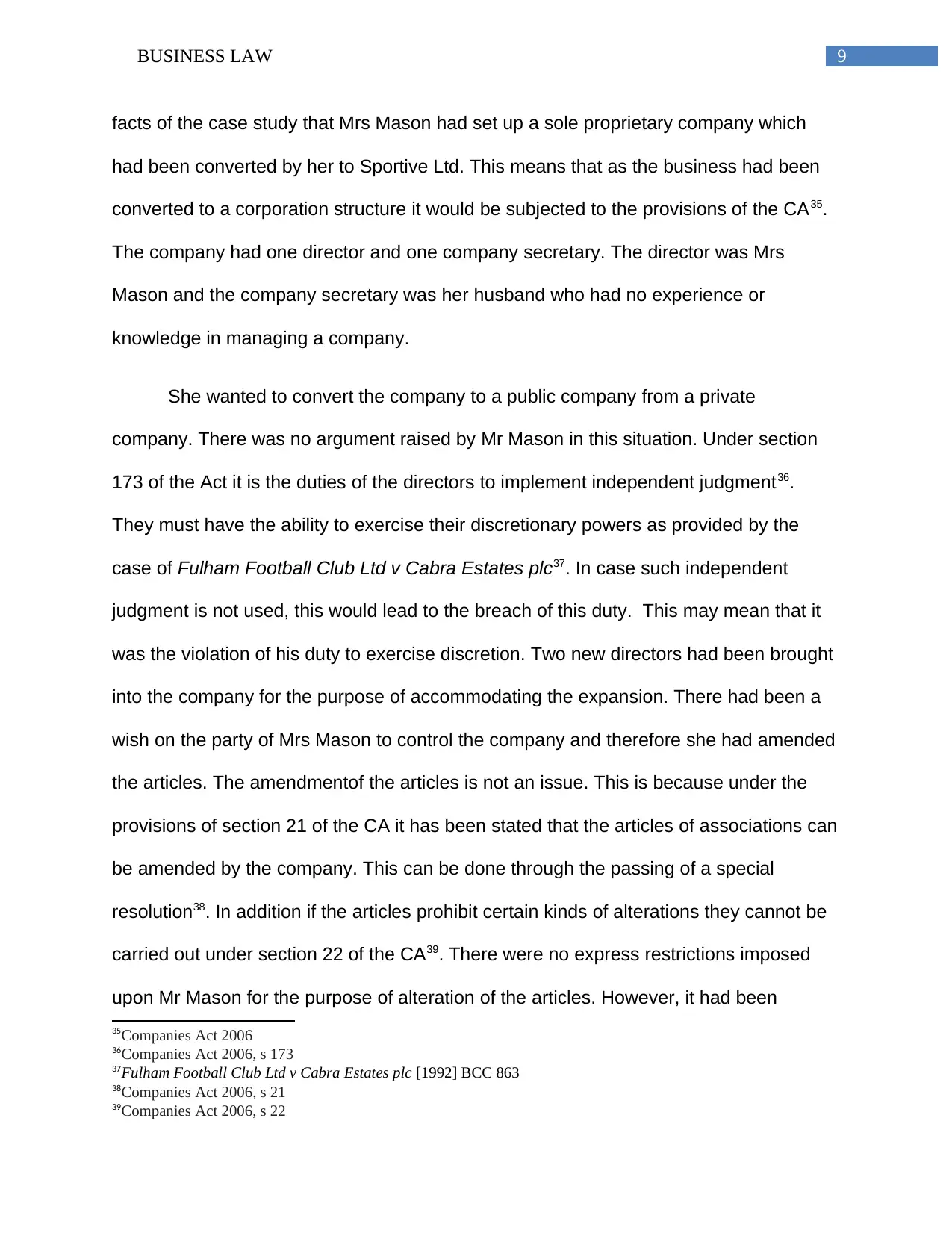
9BUSINESS LAW
facts of the case study that Mrs Mason had set up a sole proprietary company which
had been converted by her to Sportive Ltd. This means that as the business had been
converted to a corporation structure it would be subjected to the provisions of the CA35.
The company had one director and one company secretary. The director was Mrs
Mason and the company secretary was her husband who had no experience or
knowledge in managing a company.
She wanted to convert the company to a public company from a private
company. There was no argument raised by Mr Mason in this situation. Under section
173 of the Act it is the duties of the directors to implement independent judgment36.
They must have the ability to exercise their discretionary powers as provided by the
case of Fulham Football Club Ltd v Cabra Estates plc37. In case such independent
judgment is not used, this would lead to the breach of this duty. This may mean that it
was the violation of his duty to exercise discretion. Two new directors had been brought
into the company for the purpose of accommodating the expansion. There had been a
wish on the party of Mrs Mason to control the company and therefore she had amended
the articles. The amendmentof the articles is not an issue. This is because under the
provisions of section 21 of the CA it has been stated that the articles of associations can
be amended by the company. This can be done through the passing of a special
resolution38. In addition if the articles prohibit certain kinds of alterations they cannot be
carried out under section 22 of the CA39. There were no express restrictions imposed
upon Mr Mason for the purpose of alteration of the articles. However, it had been
35Companies Act 2006
36Companies Act 2006, s 173
37Fulham Football Club Ltd v Cabra Estates plc [1992] BCC 863
38Companies Act 2006, s 21
39Companies Act 2006, s 22
facts of the case study that Mrs Mason had set up a sole proprietary company which
had been converted by her to Sportive Ltd. This means that as the business had been
converted to a corporation structure it would be subjected to the provisions of the CA35.
The company had one director and one company secretary. The director was Mrs
Mason and the company secretary was her husband who had no experience or
knowledge in managing a company.
She wanted to convert the company to a public company from a private
company. There was no argument raised by Mr Mason in this situation. Under section
173 of the Act it is the duties of the directors to implement independent judgment36.
They must have the ability to exercise their discretionary powers as provided by the
case of Fulham Football Club Ltd v Cabra Estates plc37. In case such independent
judgment is not used, this would lead to the breach of this duty. This may mean that it
was the violation of his duty to exercise discretion. Two new directors had been brought
into the company for the purpose of accommodating the expansion. There had been a
wish on the party of Mrs Mason to control the company and therefore she had amended
the articles. The amendmentof the articles is not an issue. This is because under the
provisions of section 21 of the CA it has been stated that the articles of associations can
be amended by the company. This can be done through the passing of a special
resolution38. In addition if the articles prohibit certain kinds of alterations they cannot be
carried out under section 22 of the CA39. There were no express restrictions imposed
upon Mr Mason for the purpose of alteration of the articles. However, it had been
35Companies Act 2006
36Companies Act 2006, s 173
37Fulham Football Club Ltd v Cabra Estates plc [1992] BCC 863
38Companies Act 2006, s 21
39Companies Act 2006, s 22
Paraphrase This Document
Need a fresh take? Get an instant paraphrase of this document with our AI Paraphraser
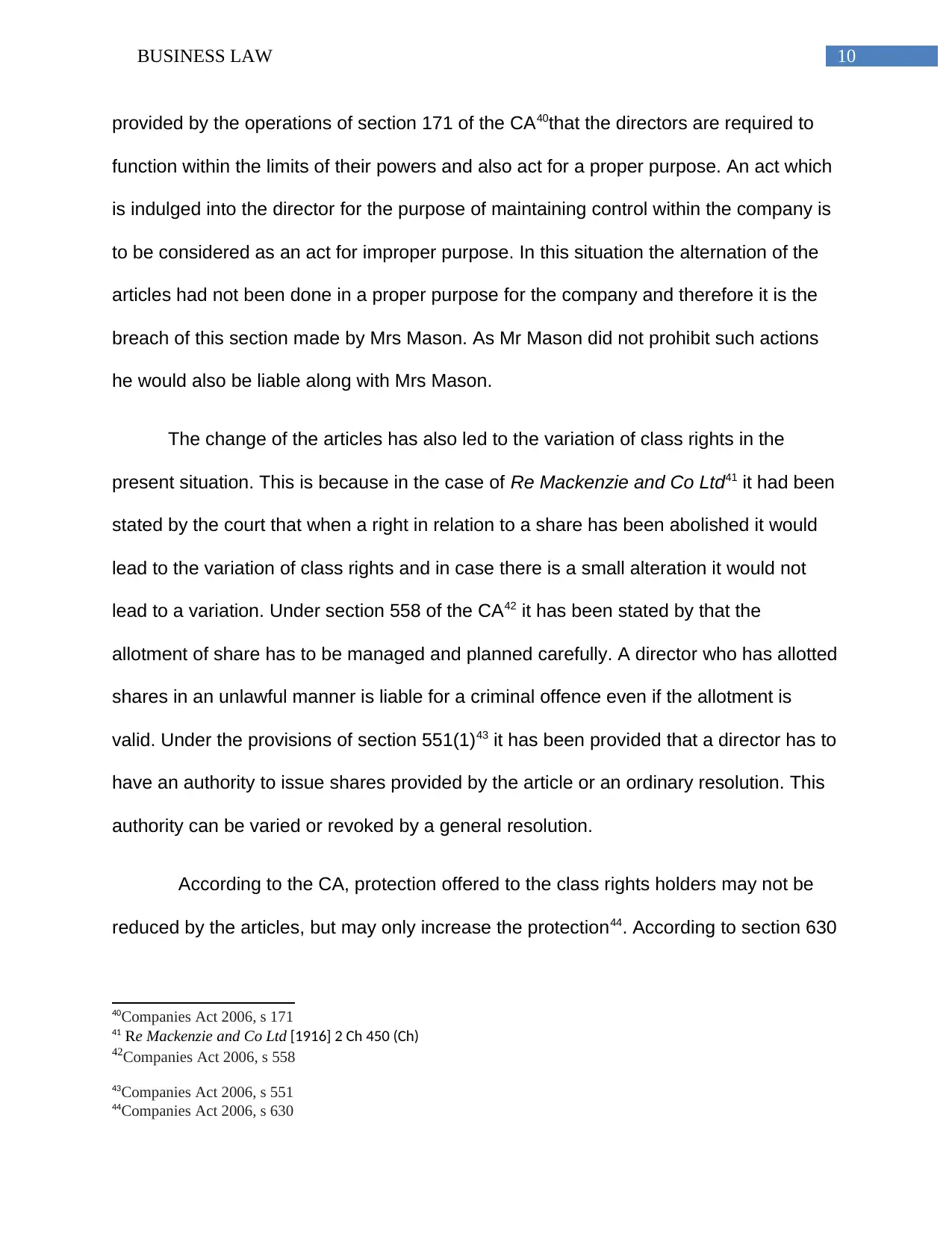
10BUSINESS LAW
provided by the operations of section 171 of the CA40that the directors are required to
function within the limits of their powers and also act for a proper purpose. An act which
is indulged into the director for the purpose of maintaining control within the company is
to be considered as an act for improper purpose. In this situation the alternation of the
articles had not been done in a proper purpose for the company and therefore it is the
breach of this section made by Mrs Mason. As Mr Mason did not prohibit such actions
he would also be liable along with Mrs Mason.
The change of the articles has also led to the variation of class rights in the
present situation. This is because in the case of Re Mackenzie and Co Ltd41 it had been
stated by the court that when a right in relation to a share has been abolished it would
lead to the variation of class rights and in case there is a small alteration it would not
lead to a variation. Under section 558 of the CA42 it has been stated by that the
allotment of share has to be managed and planned carefully. A director who has allotted
shares in an unlawful manner is liable for a criminal offence even if the allotment is
valid. Under the provisions of section 551(1)43 it has been provided that a director has to
have an authority to issue shares provided by the article or an ordinary resolution. This
authority can be varied or revoked by a general resolution.
According to the CA, protection offered to the class rights holders may not be
reduced by the articles, but may only increase the protection44. According to section 630
40Companies Act 2006, s 171
41 Re Mackenzie and Co Ltd [1916] 2 Ch 450 (Ch)
42Companies Act 2006, s 558
43Companies Act 2006, s 551
44Companies Act 2006, s 630
provided by the operations of section 171 of the CA40that the directors are required to
function within the limits of their powers and also act for a proper purpose. An act which
is indulged into the director for the purpose of maintaining control within the company is
to be considered as an act for improper purpose. In this situation the alternation of the
articles had not been done in a proper purpose for the company and therefore it is the
breach of this section made by Mrs Mason. As Mr Mason did not prohibit such actions
he would also be liable along with Mrs Mason.
The change of the articles has also led to the variation of class rights in the
present situation. This is because in the case of Re Mackenzie and Co Ltd41 it had been
stated by the court that when a right in relation to a share has been abolished it would
lead to the variation of class rights and in case there is a small alteration it would not
lead to a variation. Under section 558 of the CA42 it has been stated by that the
allotment of share has to be managed and planned carefully. A director who has allotted
shares in an unlawful manner is liable for a criminal offence even if the allotment is
valid. Under the provisions of section 551(1)43 it has been provided that a director has to
have an authority to issue shares provided by the article or an ordinary resolution. This
authority can be varied or revoked by a general resolution.
According to the CA, protection offered to the class rights holders may not be
reduced by the articles, but may only increase the protection44. According to section 630
40Companies Act 2006, s 171
41 Re Mackenzie and Co Ltd [1916] 2 Ch 450 (Ch)
42Companies Act 2006, s 558
43Companies Act 2006, s 551
44Companies Act 2006, s 630
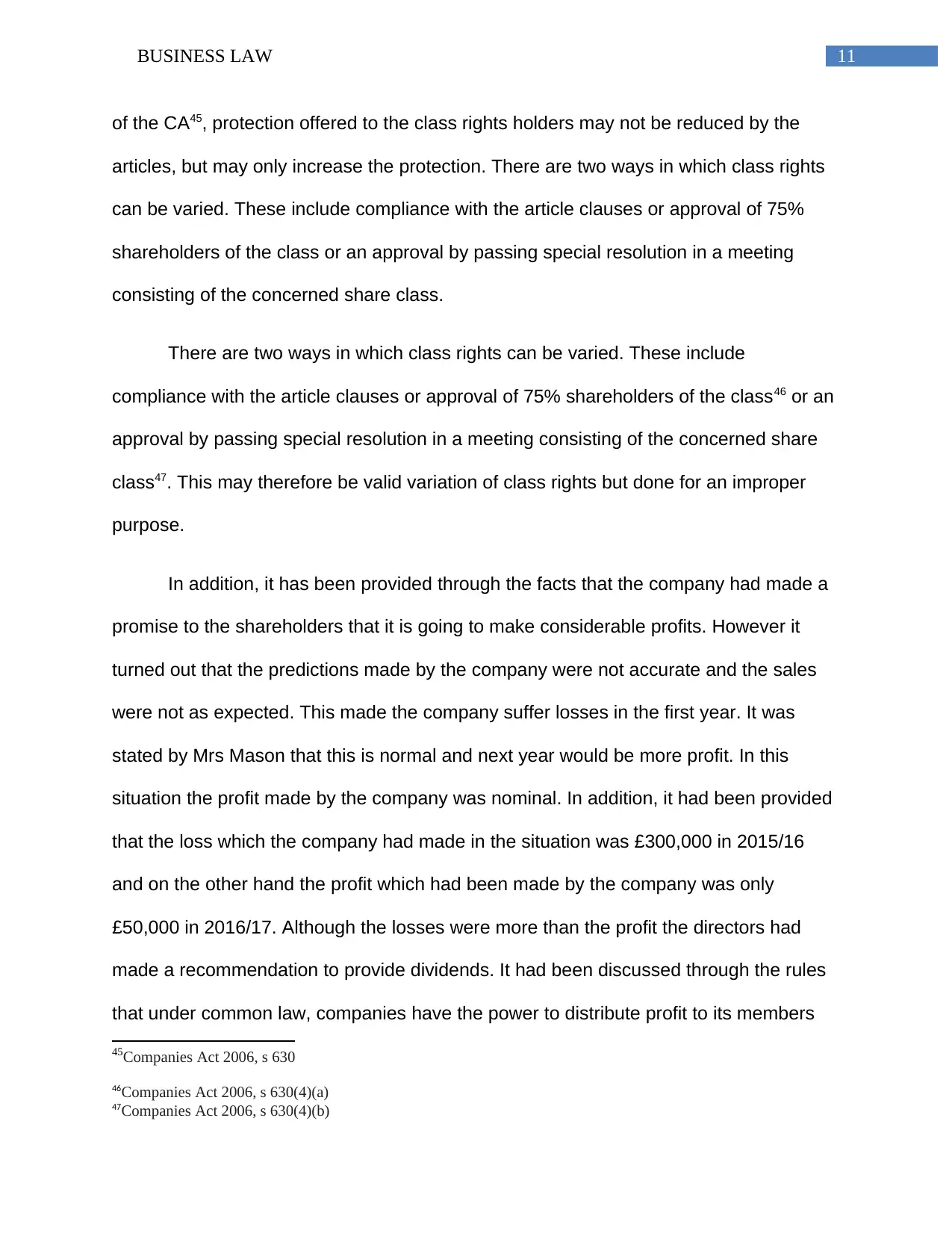
11BUSINESS LAW
of the CA45, protection offered to the class rights holders may not be reduced by the
articles, but may only increase the protection. There are two ways in which class rights
can be varied. These include compliance with the article clauses or approval of 75%
shareholders of the class or an approval by passing special resolution in a meeting
consisting of the concerned share class.
There are two ways in which class rights can be varied. These include
compliance with the article clauses or approval of 75% shareholders of the class46 or an
approval by passing special resolution in a meeting consisting of the concerned share
class47. This may therefore be valid variation of class rights but done for an improper
purpose.
In addition, it has been provided through the facts that the company had made a
promise to the shareholders that it is going to make considerable profits. However it
turned out that the predictions made by the company were not accurate and the sales
were not as expected. This made the company suffer losses in the first year. It was
stated by Mrs Mason that this is normal and next year would be more profit. In this
situation the profit made by the company was nominal. In addition, it had been provided
that the loss which the company had made in the situation was £300,000 in 2015/16
and on the other hand the profit which had been made by the company was only
£50,000 in 2016/17. Although the losses were more than the profit the directors had
made a recommendation to provide dividends. It had been discussed through the rules
that under common law, companies have the power to distribute profit to its members
45Companies Act 2006, s 630
46Companies Act 2006, s 630(4)(a)
47Companies Act 2006, s 630(4)(b)
of the CA45, protection offered to the class rights holders may not be reduced by the
articles, but may only increase the protection. There are two ways in which class rights
can be varied. These include compliance with the article clauses or approval of 75%
shareholders of the class or an approval by passing special resolution in a meeting
consisting of the concerned share class.
There are two ways in which class rights can be varied. These include
compliance with the article clauses or approval of 75% shareholders of the class46 or an
approval by passing special resolution in a meeting consisting of the concerned share
class47. This may therefore be valid variation of class rights but done for an improper
purpose.
In addition, it has been provided through the facts that the company had made a
promise to the shareholders that it is going to make considerable profits. However it
turned out that the predictions made by the company were not accurate and the sales
were not as expected. This made the company suffer losses in the first year. It was
stated by Mrs Mason that this is normal and next year would be more profit. In this
situation the profit made by the company was nominal. In addition, it had been provided
that the loss which the company had made in the situation was £300,000 in 2015/16
and on the other hand the profit which had been made by the company was only
£50,000 in 2016/17. Although the losses were more than the profit the directors had
made a recommendation to provide dividends. It had been discussed through the rules
that under common law, companies have the power to distribute profit to its members
45Companies Act 2006, s 630
46Companies Act 2006, s 630(4)(a)
47Companies Act 2006, s 630(4)(b)
⊘ This is a preview!⊘
Do you want full access?
Subscribe today to unlock all pages.

Trusted by 1+ million students worldwide
1 out of 57
Related Documents
Your All-in-One AI-Powered Toolkit for Academic Success.
+13062052269
info@desklib.com
Available 24*7 on WhatsApp / Email
![[object Object]](/_next/static/media/star-bottom.7253800d.svg)
Unlock your academic potential
Copyright © 2020–2026 A2Z Services. All Rights Reserved. Developed and managed by ZUCOL.





